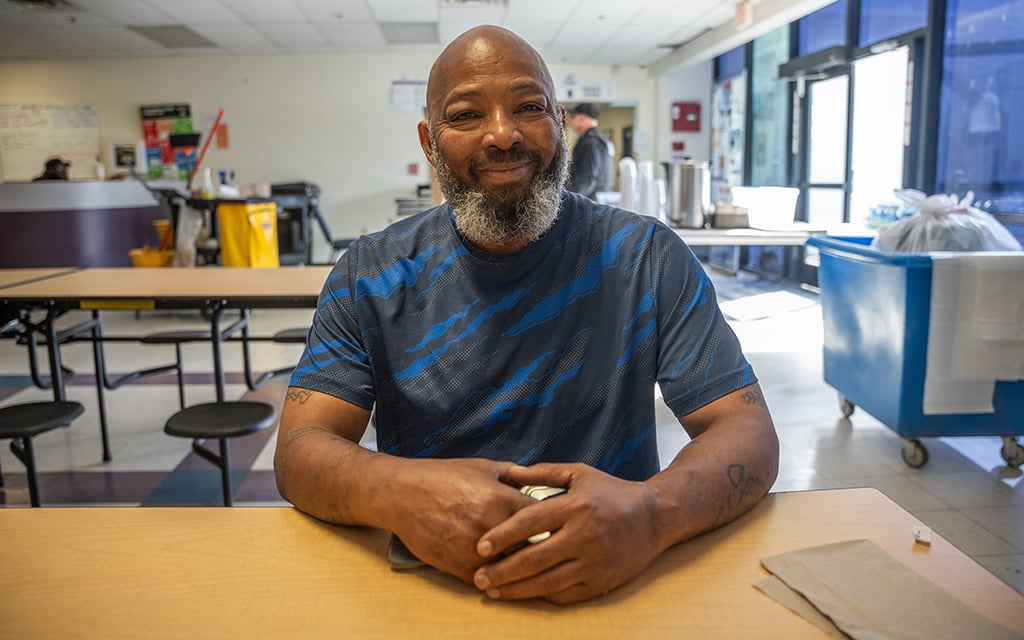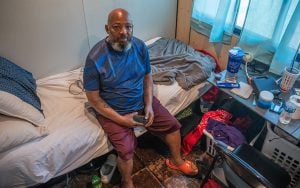
Dennis Robinson poses for a portrait in one of the Society of St. Vincent de Paul dining rooms in Phoenix on Jan. 31. (Photo courtesy of Troy Hill/The Society of St. Vincent de Paul)
PHOENIX – With temperatures in Phoenix already hitting 100 degrees, concerns for how the homeless populations will survive the heat this summer are front and center. According to the Maricopa County 2023 Heat Related Deaths Report, the homeless population accounted for 45% of the 645 heat-related deaths in the county, which saw a 52% increase in overall heat deaths compared to 2022.
That same report showed that 71% of heat-related deaths occurred on days when the National Weather Service issued an excessive heat warning. Temperatures stayed high even at night; the low recorded for one night last July was 97 degrees. Excessive heat is particularly hard for the homeless population as they don’t have indoor spaces to find relief.
The Society of St. Vincent de Paul (SVdP) – an organization dedicated to “feeding, clothing, housing and healing individuals and families” who don’t have other sources of help – is changing its focus going into the summer.
According to Jessica Berg, chief program officer for SVdP, the real danger of heat for people who are homeless is their lack of shelter makes it impossible for them to get out of scorching temperatures. The best solution is to be inside somewhere that has a working air conditioning system, Berg said, and that’s why her organization is prioritizing providing beds over walk-up services.
Even just walking outside for a prolonged period of time can be dangerous. Asphalt can get up to 121 degrees and the Arizona Burn Center warns that contact with hot asphalt or cement can cause serious burns. Berg said SVdP will be putting its resources toward beds and places for people to stay that will keep them safer for longer – for instance, the organization will be opening 171 new beds by July.

Dennis Robinson on his bed in the Society of St. Vincent de Paul’s Washington Street Shelter in Phoenix, on Jan. 31. (Photo courtesy of Troy Hill/The Society of St. Vincent de Paul)
Dennis Robinson is one individual who has been helped by SVdP’s resources. He is a resident of the Washington Street Shelter and was assisted in getting a job as a chef through the organization’s workforce program.
Robinson has been staying at the Washington Street Shelter for seven months. After his sister passed away last July, he said he gave all his money to his family to pay for the funeral costs; when he got back to Arizona, his job as a house manager in a sober living home was gone. Without the job, and no money, Robinson had nowhere to go.
The heat was a real concern as last July hit record-breaking high temperatures.
“Walking out there in that heat was kind of detrimental. I’m 62 years old, and I wasn’t trying to be in all that heat, have another stroke or a heart attack,” Robinson said.
Robinson credits SVdP for helping him get a vehicle, uniforms for his job and an apartment, which he’s set to move into soon.
“I don’t know what I would have done,” Robinson said. “St. Vincent de Paul was a great help, a rescue in my life. I mean, I thank God that the shelter was here. I thank God for the resources.”
Robinson also said he uses other SVdP resources such as the dining rooms.
According to Berg, some of the dining rooms will have extended hours for heat relief this summer. In addition to shelters, dining rooms and the workforce program, SVdP has a medical clinic, a family support program and a day relief cooling center in partnership with Phoenix. The organization also helps people with their utility bills, rent, and holds drives for water, hygiene items, lip balm, sunscreen and hats.
“It’s really keeping people safe. And I think that is anywhere where we can bring people inside and make sure they have air conditioning and water and food,” Berg said.

